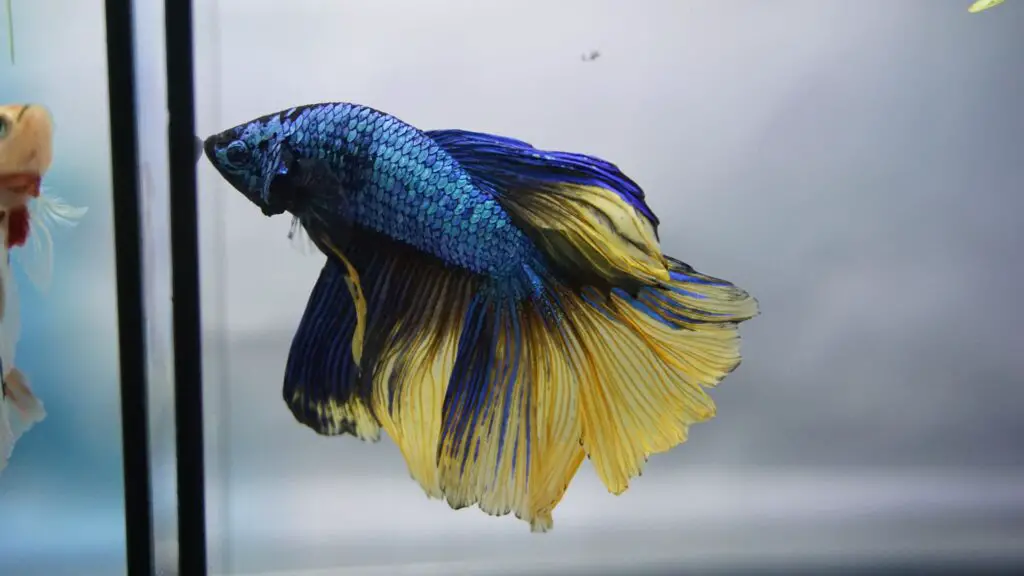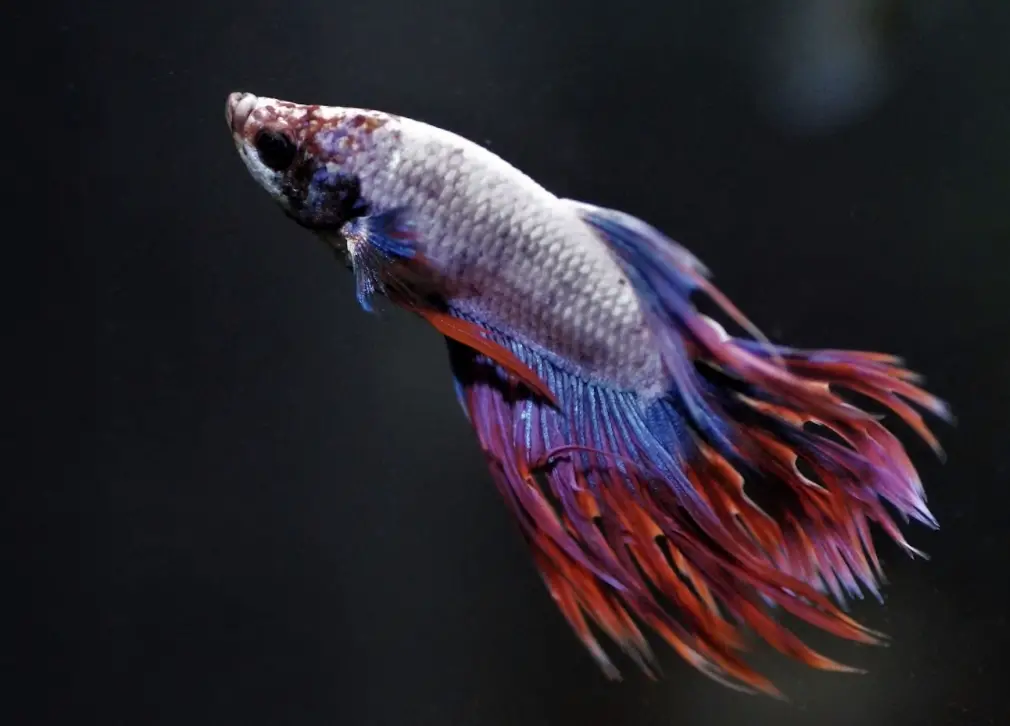Are you concerned about your betta fish swimming vertically? If so, you are not alone. Many pet owners have observed their betta fish exhibiting this behavior and wondered if something is wrong with their beloved pet. In this article, we will explore why a betta fish may swim upright to help you better understand why they do it and how to ensure that your betta remains healthy.
Various factors, such as injury, illness, or environmental reaction, can cause vertical swimming in betta fish. It is important to assess the overall health of the fish and its environment to determine the cause of vertical swimming. If the condition persists, it is recommended to seek the advice of a qualified aquatic veterinarian.
We will look at potential causes and what steps you can take if you notice your betta swimming vertically more often than usual. Knowing what could cause this behavior and its implications for your pet’s well-being can give you peace of mind when caring for your furry friend. With this knowledge, we hope to empower all pet owners by giving them the tools to keep their fish happy and healthy!
Symptoms Of Upright Swimming
An abnormal posture is a tell-tale sign of a betta fish exhibiting swimming issues. The vertical orientation with their head pointing upwards is known as upright swimming and can often be observed in the natural environment of these species. Upright swimming occurs when the betta’s subtle movements cause them to move out of its normal horizontal plane into a more vertical position. This behavior may appear sudden or erratic but usually does not last long.
The most common symptom associated with this form of swimming is that it interrupts the typical patterns seen in healthy bettas. Normally they would swim horizontally across the water surface at various depths. In contrast, an unhealthy specimen will remain largely stationary while bending towards an upward angle, sometimes extending its fins above the water level. Suppose your betta has been displaying such symptoms for extended lengths of time. In that case, consulting with a specialist who can diagnose and treat any underlying health issue causing this unusual swimming behavior is essential.

Possible Explanations
Bettas swimming upright can be caused by a variety of factors. Some of the most common are disease-causing agents, water temperature, environmental stressors, dietary deficiencies, and genetic mutations.
Disease-causing agents enter the body through contact with other fish or their environment. If these agents become too numerous in the betta’s system, it can cause them to swim abnormally.
Water temperature that is either too hot or cold for long periods can also disrupt normal movement patterns in bettas.
Additionally, environmental stressors such as loud noises or new tankmates may lead to changes in behavior, including swimming upright. Dietary deficiencies due to inadequate nutrition can also affect how a betta moves in its tank, while certain genetic mutations might predispose some fish to this behavior.
In summary, there could be many different reasons your betta is swimming upright, and each one should be considered when looking for possible causes. Identifying any underlying issues is essential so they can be treated promptly and effectively before further complications arise.
Diagnosis And Treatment
Now that we have discussed the possible explanations for why betta fish may be swimming upright, it is important to understand how to diagnose and treat this condition.
First and foremost, a careful examination of the betta fish should occur to rule out any external injuries or illnesses. To do this, owners must observe their fish in their tanks and look for signs of distress, such as difficulty breathing or unusual behaviors.
Furthermore, water testing should also be conducted to ensure that the tank environment is not contributing to the problem.
Once an owner has determined that there are no physical issues causing betta fish to swim upright, treatment can begin with dietary adjustments. Owners should consider providing more high-quality proteins such as frozen foods and live worms if necessary.
In addition, Vitamin C supplements can help improve overall health and provide additional nutrients when needed.
Finally, environmental changes like increasing oxygen levels or decreasing temperature may also help alleviate symptoms associated with betta swimming upright. With proper diagnosis and treatment, owners can often resolve this issue quickly so their beloved pets can return to normal behavior soon!

Long-Term Health Effects
When betta fish swim upright, it can have long-term health effects on the fish. Primarily, this is due to a lack of swimming space and poor water parameters within its aquarium environment. Poor water quality will cause stress for the fish, resulting in unhealthy behaviors such as regular bouts of vertical swimming. Over time, this can lead to fatigue and exhaustion, weakening their immune systems and causing other physical ailments that may not be visible at first glance.
Prolonged exposure to low oxygen levels or temperatures outside the optimal range also contributes to these negative effects. Proper maintenance of the aquarium environment must include frequent monitoring of temperature and pH level variations so that your betta’s overall health isn’t compromised. Additionally, maintaining a clean tank with plenty of room for your betta to move around freely allows it to get adequate exercise without resorting to unusual swimming patterns like upright posture for extended periods.
Having a healthy betta means conducting routine checkups and providing them with suitable living conditions; from understanding ideal water parameters and assessing any potential threats posed by nearby objects (e.g., decorations) or inhabitants inside the tank – all are necessary steps towards ensuring your betta lives a comfortable life free from harm where they can display normal behavior instead of engaging in unnatural activities caused by environmental issues.

Frequently Asked Questions
How Often Should I Feed My Betta Fish?
Swimming vertically can indicate that your betta fish is feeling stressed or unwell. But the opposite applies when it comes to feeding time – a healthy and happy betta needs regular meals. Like an anchor in the storm of unpredictable waters, providing consistent meal times for your pet will help them thrive!
Feeding a betta should be approached like clockwork: as regularly as possible. Picture this – every day at sunrise, you rise from bed with purpose, ready to care for your little finned friend. Here’s a 4-part list of what you need to do:
- Feed small portions twice daily
- Give freeze-dried food no more than once weekly
- Use pellets or flakes specifically designed for bettas
- Monitor their appetite and adjust accordingly
As with any other organism, overfeeding could cause health issues such as bloating and swim bladder disease. That being said, if done right, feeding your betta can provide moments of joyous interaction between the two of you! So take some time each day to observe how much they eat during feedings; it’ll give you insight into how well they do. These steps will ensure that your beloved betta lives a long, vibrant life.
So show them some love by creating balanced mealtimes tailored just for them – trust us, they won’t mind one bit!
How Much Space Do I Need To Provide For My Betta Fish?
When caring for a betta fish, many people overlook one particular fact: how much space do they need? While these small creatures may not require vast tanks or ponds like other aquatic life, the amount of space you provide for them can impact their overall health.
Providing adequate space is essential in ensuring your betta’s well-being, allowing them room to swim and explore while offering refuge from potential predators. They should have at least five gallons of water per fish; however, if you can provide more than this, all the better. Additionally, try providing plenty of hiding spots around their tank—driftwood, rocks, plants, and decorations—so your fish can feel secure when needed.
And don’t forget about cleanliness! A healthy environment requires regular maintenance, such as weekly water changes and filter cleaning. Keeping up with these tasks will help keep your betta happy and healthy for years. So ensure you give your little buddy enough swimming room, and never forget to clean their home!
What Type Of Water Should I Use For My Betta Fish?
Caring for a betta fish can be both thrilling and challenging! It’s like having your mini aquarium in the palm of your hand. But one major question many owners have is, what type of water should I use for my betta fish? Like a fantastic Broadway play, the answer to this question is complex yet intriguing.
Let’s start with the basics: Bettas need clean, filtered water that has been dechlorinated. This means you must invest in a good quality filter to keep your pet’s tank environment safe and healthy. You may also want to consider adding some natural decorations, such as plants or gravel, to help provide hiding places and oxygenation for your fish. If you don’t already know, Betta fish are sensitive creatures – so any sudden change in water temperature could cause serious harm if not monitored carefully.
To ensure you provide ample care for your new friend, it’s important to test the pH levels regularly using a simple testing kit from your local pet store (or online). The ideal range should be between 6 – 8 pH – anything lower than 6 might result in health issues. Finally, remember to replace about 25-50% of the tank’s water every week – without fail! As they say, ‘A clean home is a happy home’ – and nowhere else does this ring truer than when caring for a Betta Fish! Regularly maintaining and monitoring water conditions can ensure that your little aquatic buddy stays happy and healthy throughout their lifetime.
What Other Fish Can I Keep With My Betta Fish?
When it comes to your betta fish, you want to ensure its living environment is the best. But what other fish can you keep with a betta? Knowing the answer is important so your pet can thrive in its tank!
The first thing to consider is whether or not any other fish will compete for resources like food and space. Betta fish are territorial, so they need plenty of room. In addition, many fish species have very specific water needs, which could conflict with your betta’s if they aren’t compatible.
Finally, some types of fish may bully or harass your betta – even when they’re just trying to get along. So when selecting potential tank mates, choose peaceful varieties such as Corydoras catfish or small tetras like neon and glowlight tetras. Avoid aggressive species such as cichlids unless you provide plenty of hiding spaces for the betta. Remember that overcrowding will also increase aggression between tankmates and should always be avoided.
By considering these factors, you’ll create an ideal home for your betta and their new friends – providing them with a stress-free environment where everyone gets along swimmingly!
What Is The Best Temperature For My Betta Fish?
Are you wondering what the ideal temperature is for your betta fish? Maybe you’ve heard conflicting advice from other pet owners or are unsure how to maintain your tank properly. Well, don’t worry – we’re here to help!
When it comes to keeping a healthy environment for your betta fish, temperature plays an important role in their overall well-being. To get the most out of your fish-keeping experience and ensure that your aquatic friend stays happy and healthy, here’s a quick list of things to consider when creating the perfect habitat:
- Temperature should be between 76°F (24°C) and 82°F (28°C).
- Keep water clean through regular maintenance/water changes.
- Monitor levels of nitrite, ammonia, and pH regularly.
- Invest in an aquarium heater if needed.
Having the right temperature for your betta fish can make all the difference in their happiness and health. Aiming too high could cause them stress, while aiming too low can lead to illness or even death due to hypothermia; however, by keeping their environment within this optimal range, they will thrive! Plus, using a thermometer helps avoid any guesswork, so monitoring temperatures is easy peasy.
It’s also important to remember that home temperatures may fluctuate throughout the year depending on where you live, requiring some extra attention; therefore, investing in an aquarium heater might be wise and ensuring sufficient filtration systems are installed correctly. That way, you have peace of mind knowing your little buddy has exactly what they need, and you also enjoy watching them easily explore their new home!
Conclusion
It’s important to note that swimming upright is abnormal for betta fish and can indicate a health issue. If your betta fish starts exhibiting this symptom, it’s best to take them to the vet as soon as possible to ensure they get diagnosed and treated properly. Long-term effects may include difficulty eating or breathing, which could lead to further complications if left untreated.
Overall, understanding what causes betta fish to swim upright helps us provide better care for these beautiful creatures. By recognizing the signs early on, we can prevent long-term issues from developing in our bettas and keep them healthy and happy. As owners, it’s our responsibility to pay attention to their behaviors to identify any potential problems before they become serious. With proper care and vigilance, you’ll have a healthy pet for many years!
